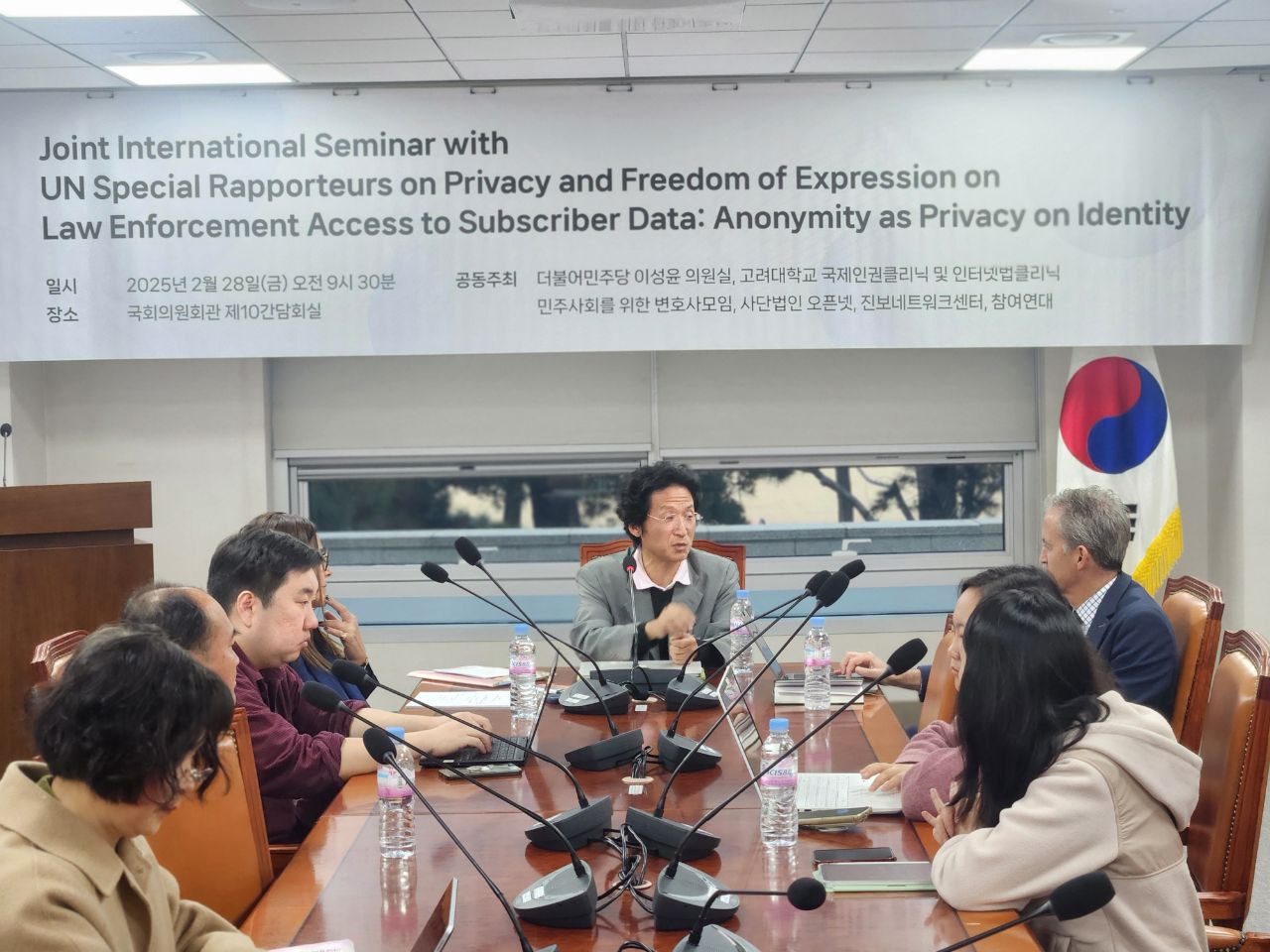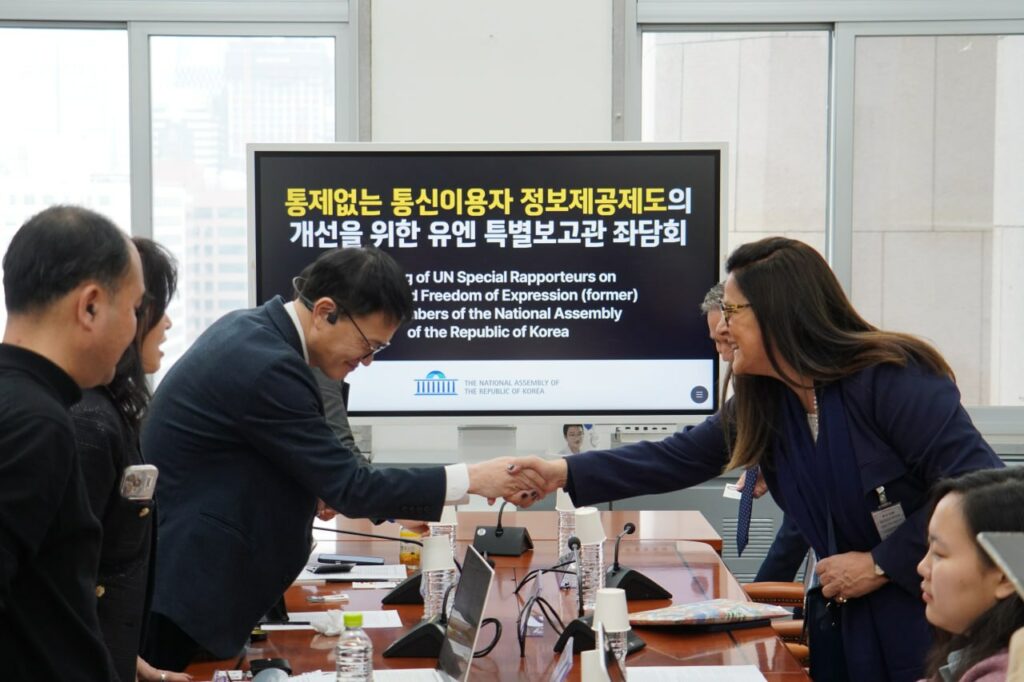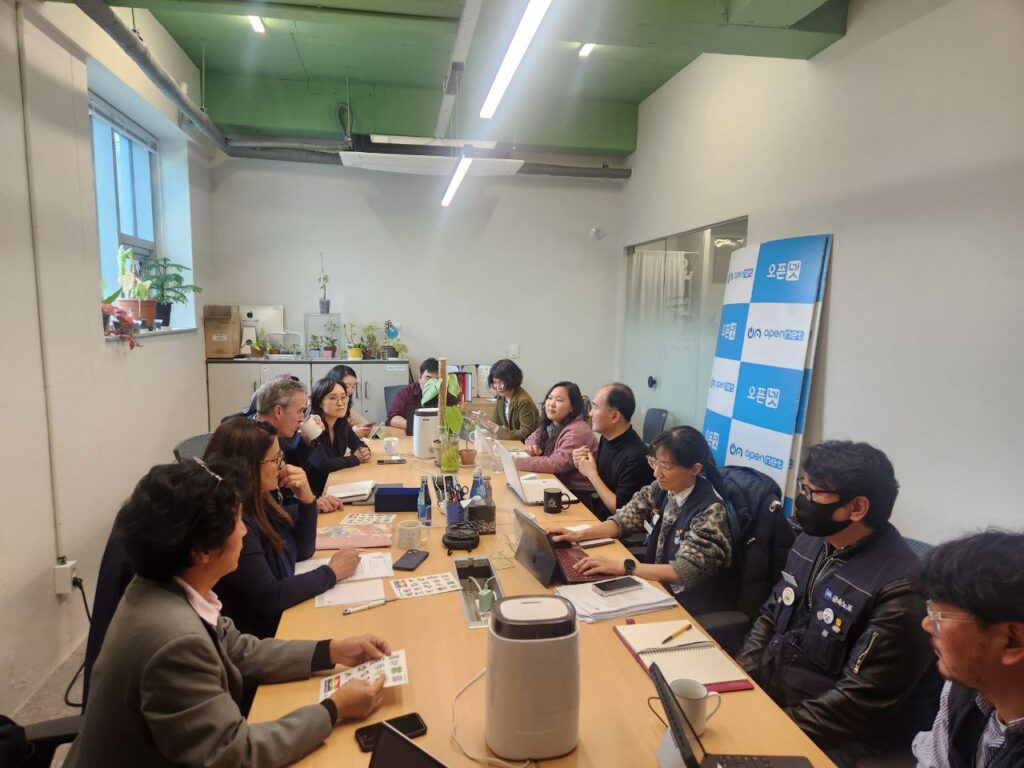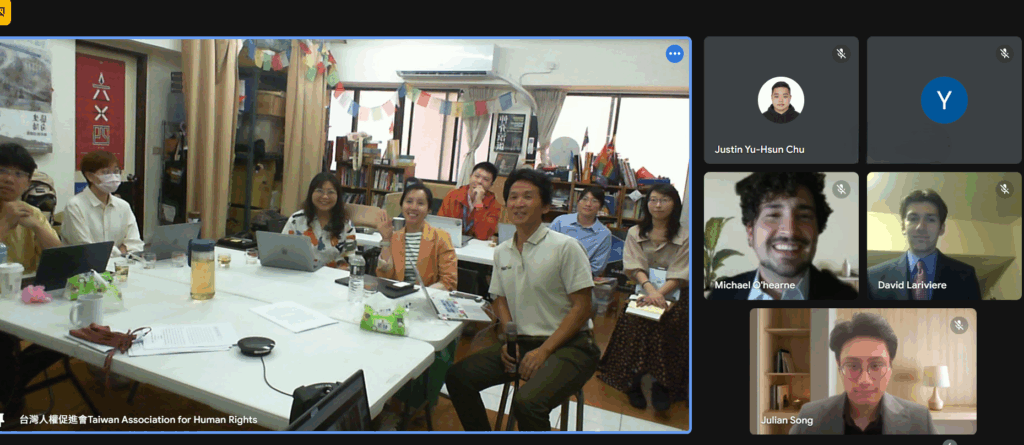
OpenNet, Lawyers for a Democratic Society, Jinbonet, People’s Solidarity for Participative Democracy, and the office of Democratic Party Rep. Lee Seong-yun jointly hosted an international seminar on February 28th. UN current and former human rights special rapporteurs were invited to discuss issues with communications user information provision in Korea.
In this seminar, under the moderation of Park Kyung-sin, director of OpenNet (and professor at Korea University Law School), UN Privacy Special Rapporteur Ana Brian Nougrères and David Kaye, a UC Irvine professor and former Special Rapporteur on Freedom of Expression, discussed the problems and improvement measures of the communication user information provision under the Telecommunications Business Act from the perspective of international human rights standards.

Special Rapporteur Ana Brian stated that “The ability to communicate without unnecessary scrutiny is essential to open societies, and its restriction can lead to significant human rights violations.” She warned that “metadata is often underestimated in its potential impact, but when analyzed in bulk, it allows for the inference of personal habits, political opinions, and even private relationships.” She also proposed legislative reforms including applying warrant principles, strengthening transparency in government information requests, and reinforcing strict standards and penalties for violations.
Former Special Rapporteur David Kaye emphasized that “the freedom of anonymous communication is a core right for guaranteeing freedom of expression protected by international human rights norms.” He further noted that “if the UN Cybercrime Convention takes effect, it could further justify and deepen state surveillance and information sharing through mutual monitoring. Therefore, it is important for South Korea not to ratify the UN Cybercrime Convention. Cybercrime can be properly addressed through ratification of the Budapest Convention, which has procedural safeguards for surveillance.”
David Kaye submitted an opinion to the Constitutional Court in 2017, arguing that the communication user information provision system restricts freedom of anonymous communication and violates privacy. In this case, the Constitutional Court made a decision of constitutional non-conformity for the communication data provision system (currently the communication user information provision system), and in 2023, the National Assembly mandated post-notification through legal amendments. However, both Ana Brian and David Kaye judged that the current law does not meet warrant principle requirements. Joseph Kanatacci, the former Privacy Special Rapporteur who officially visited in 2019, also expressed concerns about the communication user information provision system and strongly emphasized that court approval is absolutely necessary when providing information.
Following the seminar, Special Rapporteurs Ana Brian and David Kaye attended a roundtable discussion at the National Assembly on “Improving the Communication User Information Provision System,” hosted by National Assembly Health and Welfare Committee Chair Park Ju-min. The event was also attended by experts including Science, Technology, and Broadcasting Committee member Rep. Hwang Jung-ah, OpenNet Director Park Kyung-sin, and Jinbonet Representative Oh Byung-il.
Ana Brian stated that “Under current Korean law, freedom of expression is suppressed, and basic rights cannot be guaranteed in the digital age,” and proposed “revising the Telecommunications Business Act, which allows investigative agencies to indiscriminately collect personal information, to achieve institutional improvements that align with international human rights norms.”
David Kaye emphasized that “To ensure the vocalization of vulnerable groups’ perspectives and free media activity, freedom of expression must be substantially guaranteed through protecting the freedom of anonymous communication.” He also urged “Korea to actively review ratifying the Budapest Convention from a forward-looking perspective.
On the same day, the special rapporteurs and civil society organizations held a roundtable meeting at the OpenNet office. The meeting was attended by OpenNet, Lawyers for a Democratic Society, Korea Progressive Network Center, People’s Solidarity for Participative Democracy, and the National Metal Workers’ Union of the Korean Confederation of Trade Unions, who conveyed current issues such as job surveillance and investigative agencies’ indiscriminate collection of communication user information to the special rapporteurs.

At this meeting, a certificate of appreciation was presented to David Kaye, the former special rapporteur, in recognition of his efforts. David Kaye made significant contributions to the Constitutional Court’s decision of constitutional non-conformity regarding the communication user information provision system, submitted an opinion brief on the unconstitutionality lawsuit regarding COVID-19 movement tracking, submitted an opinion brief on the unconstitutionality lawsuit concerning mobile phone real-name verification, and officially communicated with the South Korean government regarding the Korea Communications Commission’s SNI blocking, thereby contributing to institutional improvements in Korea.
Concept Note
Joint International seminar with UN Special Rapporteurs on Privacy and Free Expression (former) : Anonymity as privacy on identity
Each instance of telecommunication consists of content data and metadata. Some of the metadata are the data identifying the subscribers to the telecommunication services. Governments have been allowed to acquire content data and other metadata for law enforcement purposes but on the condition that they obtain advance authorizations from judicial or other independent bodies that balance between the privacy of the data subjects and the necessity and proportionality of the law enforcement actions. However, when they acquire the subscriber identifying data, the laws of the world vary greatly in regulating access to it. Some countries require judicial warrants, and others require lesser (e.g., subpoena) or no procedure at all.
David Kaye, the former UNSR on freedom of expression, through a seminal report in 2015, demonstrated how anonymity and encryption are legitimate tools that people can use to protect their privacy. In that sense, the access to the subscribers’ identity or their unmasking certainly erodes people’s privacy just as the decryption order or other compulsive access to communications content will. However, the world, by not extending the umbrella of procedural safeguards on to the subscriber identifying data, seems to have not progressed from the time when the phone books published all the phone numbers and matching names for the public. While the Canadian Supreme Court explicitly required a warrant and the European Court of Human Rights also affirmed a Slovenian law, the uncertainty remains as the European Court of Justice issued two conflicting decisions on France and Sweden and UK. The Germany’s highest court seems satisfied with a heightened substantive safeguard instead of a procedural one.
South Korea is one country that has suffered from such lack of a clear international standard. Joseph Cannataci, the former UNSP on privacy, in his state visit to Korea in 2019, already showed alarm at the several million unmaskings per annum and proposed a special judicial or a quasi-judicial panel to abate the privacy crisis. Despite the UN Human Rights Committee’s advice to implement a warrant process in 2015 and the country’s constitutional court’s decision of nonconformity in 2022, the massive, unvetted access has continued. In 2023, it was revealed that the prosecutors investigating journalists on the charges of defaming the incumbent President unmasked more than 3,000 phone users in an apparent attempt to track down the journalists’ sources. This incident showed the high stakes that ride on the government’s access to the identity data.
We bring the worlds’ experts including the current UN official of highest stature on the subject matter, Ana Brian Nougreres, the current UNSR for the right to privacy and local stakeholders to discuss the way forward on this issue which will be valuable for discussions around the world.
Time: February 28, 2025 9:30 am through 10:30 am
Place: National Assembly, 간담회 Room No. 10
Featuring:
- David KAYE, the former United Nations Special Rapporteur on Freedom of Opinion and Expression, Professor, University of California at Irvine School of Law (confirmed)
- Ana BRIAN NOUGRERES, the United Nations Special Rapporteur on the Right to Privacy, Professor of Law, Privacy and ICT at the University of Montevideo (confirmed)
Moderator: K.S. Park, Professor, Korea University Law School; Open Net, Executive Director
Sponsored by:
Open Net
People’s Solidarity for Participatory Democracy
Korean Progressive Network JINBONET
MINBYUN Lawyers for Democracy
Korea University Law School’s International Human Rights Clinic
Korea University Law School’s Internet Law Clinic
Members of Parliament Sung Yoon LEE

![[Rightscon 2025 Taipei] SEACPN on Content Moderation](https://www.opennetkorea.org/wp-content/uploads/et_temp/Screen-Shot-2025-03-16-at-1.09.36-AM-218207_1080x550.png)
0 Comments